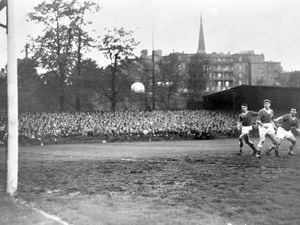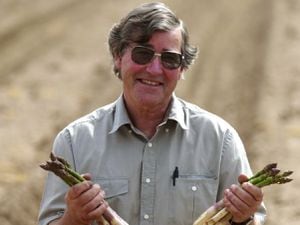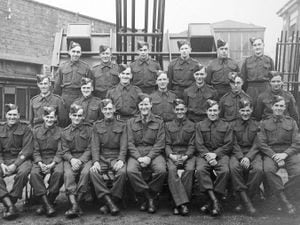Flashback to 1981: Apprentices get stuck into work at Josiah Parkes in Willenhall
They were the talented men and women whose skills put a small town in the Black Country on the map.
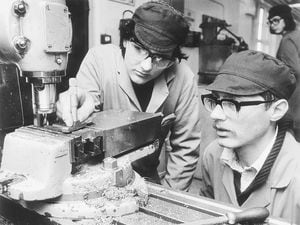
The lock makers of Willenhall made the town world famous and ensured names such as Union, Yale, Chubb and Squire went down in history.
Among the industry's early pioneers was Josiah Parkes which became the biggest manufacturer of locks and ironmongery in western Europe.
At the start of 1981, the company based in Willenhall was running a successful training scheme and was taking on 12 apprentices every year
The company was first founded by iron traders, Josiah and William Parkes in 1840 in Willenhall.
The original partnership was dissolved in 1868 when Josiah was joined by his son William Edmund. In 1885 James Harry, another son joined the firm which became known as Josiah Parkes and Sons.
The family business began concentrating on the manufacture of locks in 1889, employing a handful of locksmiths.
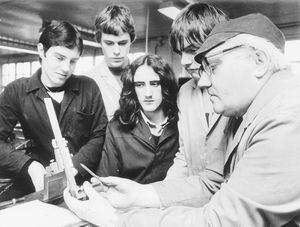
By the late 1890s they were employing enough people to join the British Lock Manufacturers Association, which tried to bring manufacturers together to monitor workers pay and conditions.
By 1906 there were approximately 35 people employed in lock manufacture, and the numbers grew to 100 in 1913, 303 in 1919 and 505 in 1934.
A Gazetteer of Lock and Key Makers by Jim Evans states: "An important step was taken in 1911 company began the manufacture of cylinder locks and latches started. At the time comparatively few were being made in this country. In 1913 the company was able to expand and build a new lock shop adjoining the original Union Street premises."
"At the beginning of the war trade was depressed due to few government contracts and the decrease in exports. But in due course the factory was turned over to the production of munitions.
"By 1917 so many men had enlisted that Parkes like most other manufacturers in the area, had to employ women workers. When the war ended the women did not automatically lose their employment. Conditions were not easy for women employees - they were not allowed to speak at work and had to meet together to walk home at the end of the day, to avoid attracting men’s attention," it adds.
In the 1930s the Union Street premises in Willenhall were modernised and a new office block was completed in 1933.
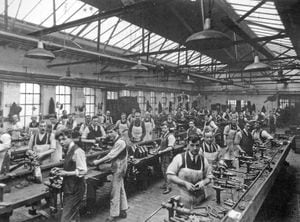
During the Second World War, the skills of the factory's talented workers was used to manufacture essential munitions, including grenades, fuses for shells and detonators as well as locks to secure the spinners of aeroplanes and thousands of padlocks to secure kit bags and numerous other purposes.
After the conflict ended the business, which had become a public company in 1936, continued to grow with different family members playing a part over the years.
The company merged with Chubbs of Wolverhampton in 1965 and in 1977 Josiah Parkes's excellent record in the export trade was rewarded by becoming the first lock manufacturer to be honoured by receiving the Queen's Award for Export Achievements. In 1984 both companies were taken over by Racal Electronics and as a result of the takeover, all commercial production was eventually transferred to the Josiah Parkes sites in Portobello and Union Street, Willenhall. Only Chubb Safe Equipment Company and Chubb High Security remained at Wednesfield.
But despite the amalgamation and the death of the last Parkes brothers in the 1960s, Josiah Parkes still maintained features of the original family business.
"Although most of the components for locks and latches are made on a production line, the final assembly is still done by hand because we've found people do it better.
"However, it's not a smithing industry any more _we now employ engineers and chemists," explained home sales director Martin Bannister in 1988.
In 1993, Josiah Parkes' revolutionary electronic lock was named `Invention of the year', by leading trade journal Building Products.
Called Electro, the key-based security device is claimed to be superior to existing push button or card systems and was designed for town halls, offices, banks and museums, where there has to be tight control of keys.
By the mid-1990s, Josiah Parkes was the biggest manufacturer of locks and ironmongery in western Europe with its Willenhall factories producing 16,000 different products with the brand-name Union.
And in the UK, the firm provided 50 per cent of locks fitted on new houses, commercial premises shops and factories.
Racal subsequently sold Chubbs to Williams Holdings Plc, in 1997, who instigated a major redevelopment programme. In August, 2000, Chubb and the rest of the lock security group were acquired by Assa Abloy, a Swedish based lock manufacturer.


